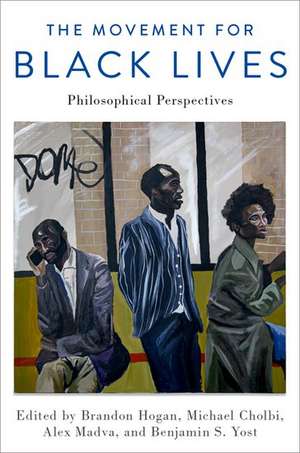The Movement for Black Lives: Philosophical Perspectives
Editat de Brandon Hogan, Michael Cholbi, Alex Madva, Benjamin S. Yosten Limba Engleză Paperback – 2 feb 2022
| Toate formatele și edițiile | Preț | Express |
|---|---|---|
| Paperback (1) | 190.44 lei 10-16 zile | +59.91 lei 4-10 zile |
| Oxford University Press – 2 feb 2022 | 190.44 lei 10-16 zile | +59.91 lei 4-10 zile |
| Hardback (1) | 517.58 lei 31-37 zile | +112.05 lei 4-10 zile |
| Oxford University Press – 2 feb 2022 | 517.58 lei 31-37 zile | +112.05 lei 4-10 zile |
Preț: 190.44 lei
Preț vechi: 232.90 lei
-18% Nou
Puncte Express: 286
Preț estimativ în valută:
36.45€ • 39.61$ • 30.64£
36.45€ • 39.61$ • 30.64£
Carte disponibilă
Livrare economică 20-26 martie
Livrare express 14-20 martie pentru 69.90 lei
Preluare comenzi: 021 569.72.76
Specificații
ISBN-13: 9780197507780
ISBN-10: 0197507786
Pagini: 320
Dimensiuni: 236 x 156 x 18 mm
Greutate: 0.45 kg
Editura: Oxford University Press
Colecția OUP USA
Locul publicării:New York, United States
ISBN-10: 0197507786
Pagini: 320
Dimensiuni: 236 x 156 x 18 mm
Greutate: 0.45 kg
Editura: Oxford University Press
Colecția OUP USA
Locul publicării:New York, United States
Recenzii
For scholars and laity in the fields of race studies or philosophy, this book offers an important examination of the theoretical foundations and issues of social and political philosophy. The uniqueness of this book is that the essays offer both support for and critiques of the foundational assumptions and arguments underlying different scholarly/activist positions. The volume also provides a theoretical discussion of how to move away from leadership--oriented activism/scholarship and toward democratic/cooperative-oriented activism/scholarship. Though clearly rooted in philosophy, chapters are accessible to readers of all levels. This would be an excellent book for class discussion and student research.
This volume is evidence of the fruitfulness of philosophical reflection on and engagement with social movements, as well as being an important contribution to the literature on racial justice. For those looking for philosophical insights into the Movement for Black Lives, this book is essential reading.
This volume is evidence of the fruitfulness of philosophical reflection on and engagement with social movements, as well as being an important contribution to the literature on racial justice. For those looking for philosophical insights into the Movement for Black Lives, this book is essential reading.
Notă biografică
Brandon Hogan is an Associate Professor of Philosophy at Howard University. His work has appeared in Contemporary Pragmatism, The Journal of Pan African Studies, and the Berkeley Journal of African American Law and Policy. He earned a PhD from the University of Pittsburgh under the supervision of Robert Brandom and a JD from Harvard Law School.Michael Cholbi is Chair in Philosophy at the University of Edinburgh. His books include Suicide: The Philosophical Dimensions (Broadview, 2011), Understanding Kant's Ethics (Cambridge University Press, 2016), and Grief: A Philosophical Guide (Princeton University Press, expected 2021). He is the editor of several scholarly collections, including Immortality and the Philosophy of Death (Rowman and Littlefield, 2015); Procreation, Parenthood, and Educational Rights (Routledge, 2017); and The Future of Work, Technology, and Basic Income (Routledge, 2019). He is the the co-editor of the textbook Exploring the Philosophy of Death and Dying: Classic and Contemporary Perspectives (Routledge, forthcoming 2020). In recent years, he has been an academic visitor at Australian National University, the University of Turku (Finland), and the Hastings Center. He is the founder of the International Association for the Philosophy of Death and Dying.Alex Madva is Associate Professor of Philosophy and Director of the California Center for Ethics and Policy at Cal Poly Pomona. He co-edited An Introduction to Implicit Bias: Knowledge, Justice, and the Social Mind (Routledge 2020), and his work has appeared in journals including Noûs, Ethics, The Journal of Applied Philosophy, Pacific Philosophical Quarterly, Ergo, Wiley Interdisciplinary Reviews (WIREs): Cognitive Science, and the International Journal of STEM Education. He has run numerous workshops and training sessions on bias, stereotype threat, and impostor syndrome for schools, courts, and wider audiences.Benjamin S. Yost is Professor of Philosophy, Adjunct at Cornell University. He was previously Professor of Philosophy at Providence College. His book, Against Capital Punishment, was published with Oxford University Press in 2019. Other published work appears in journals such as Utilitas, Journal of the American Philosophical Association, Kantian Review, and Continental Philosophy Review.
